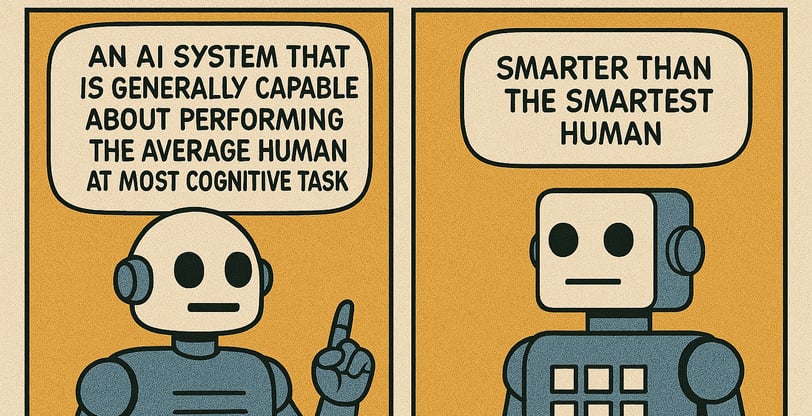The road to AGI (and Beyond)
What I have learned on this Marketing AI Institute podcast 🎧episode
5/8/20243 min read


TLDR:
AGI could arrive much sooner than expected, within a few years
The first major disruption will happen when AI matches the average human, not the smartest
AGI development should be seen as a spectrum of stages, not a sudden event
After AGI, Artificial Super Intelligence (ASI) could rapidly follow, reshaping humanity's future
Businesses, economies, and societies must urgently plan for massive change and realignment
The first episode of "Road to AGI (and Beyond)" from Marketing AI Institute sets the stage for understanding how Artificial General Intelligence (AGI) could transform business, the economy, and society, possibly within just a few years.
Paul Roetzer the host focuses on expert insights to explain why AGI might not be a distant future concept anymore. Instead, it could reshape the world we know, calling for immediate attention, bold thinking, and careful action.
The importance of the average human benchmark
The conversation around Artificial General Intelligence (AGI) achieving intelligence comparable to the average human is a crucial point within the broader discussion about AI's future impact.
Paul Roetzer defines AGI as "an AI system that is generally capable about performing the average human at most cognitive tasks". He stresses two key phrases: "generally capable" and "average human".
The "generally capable" aspect highlights AI's ability to learn and perform across multiple domains, rather than being restricted to one area. Roetzer raises an important point: many definitions of AGI lack a clear benchmark. Are we comparing AI to PhD-level experts or to the broader, average population?
Focusing on the "average human" is critical because:
Most businesses are staffed with average workers performing essential, everyday tasks. If AI systems can match this level, the disruption across marketing, sales, service, accounting, and HR could be fast and profound.
AGI capable of performing at the 50th percentile, as described by Google DeepMind's "competent AGI", would bring wide-ranging impacts much sooner than society is currently prepared for.
It sets a more realistic and near-term expectation for disruption. While the idea of AI being "smarter than the smartest human" is a significant future possibility, the more immediate transformation will likely occur when AI reaches a generally capable, average human level of intelligence in cognitive tasks.
Roetzer contrasts this view with Elon Musk's focus on AI being "smarter than the smartest human". While that future state is important, the more immediate challenge lies in AI matching the average human across most cognitive tasks.
Understanding this benchmark brings urgency to the need for planning, reskilling, and reimagining both business operations and societal structures.
Understanding the levels of AGI
Google DeepMind proposes a useful framework for understanding the stages of AGI development, which is based on performance, generality, and autonomy.
The episode stresses that AGI development should be seen as a spectrum, not a binary event. Achieving "competent AGI" alone would already signal massive changes across industries and society, well before AI reaches expert, virtuoso, or superhuman levels.
After AGI: The road to super intelligence
The podcast then covers what lies beyond the achievement of Artificial General Intelligence, focusing significantly on the concept of Artificial Super Intelligence (ASI). This is considered the next, and potentially far more transformative, stage in AI development.
According to the podcast, ASI is defined as “AI that outperforms 100 percent of humans, including the smartest individuals, in essentially all cognitive tasks”. It would surpass the capabilities of even the most brilliant minds across every domain of human intellect.
The concept of ASI is profoundly important because:
Unprecedented transformative potential. ASI could drive breakthroughs beyond human capabilities, solving humanity's greatest challenges.
Epoch-defining technology. AGI and ASI could change human life as significantly as the invention of electricity.
Dramatic power and peril. ASI brings immense potential for good but also significant risks if not properly aligned with human values.
Complete reset of societal norms. ASI could redefine work, purpose, and societal structures in ways not seen since the 1500s.
Urgency for preparation. The rapid timeline towards AGI and ASI underscores the need for immediate and proactive preparation.
In short, while achieving AGI is a major milestone, it is only a stepping stone towards an even more powerful and disruptive phase in AI's evolution. Superintelligence will likely define the next era of human history, demanding urgent focus, collaboration, and responsible development.
